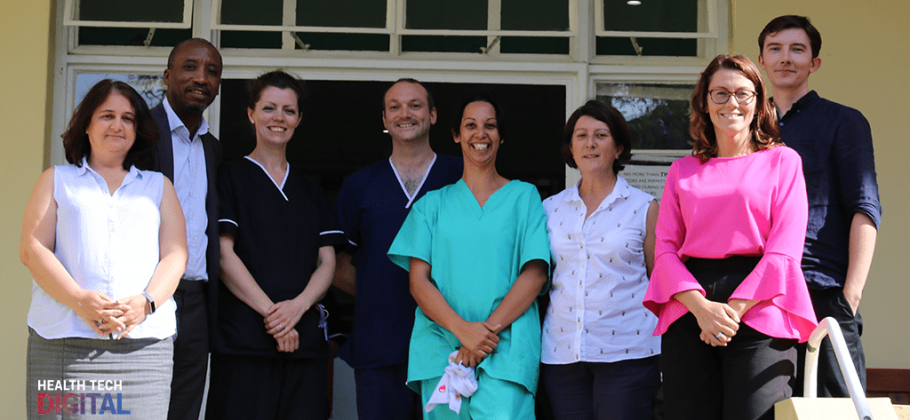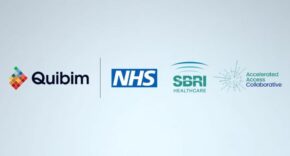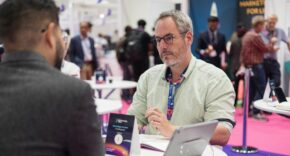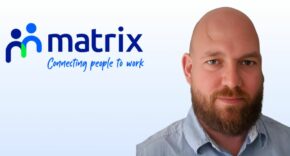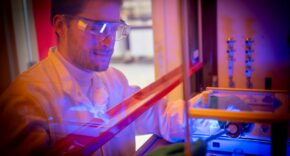British medical technology company PatientSource has been awarded the contract to install a game-changing Electronic Patient Record (EPR) system on the remote island of St Helena, a community which, until last year, was entirely dependent on supplies and specialist services located a five-day sea voyage away in Cape Town.
Saint Helena General Hospital is the world’s most remote medical centre, located on a volcanic island 4,600 miles away from the UK in the South Atlantic Ocean.
The island of St Helena, part of the British Overseas Territory, is about 10 miles long and six miles wide with a population of 4,534 -less than the number of fans you’ll find in the UK’s smallest football stadium- many of whom suffer from preventable chronic diseases such as diabetes and heart disease.
According to the island’s Health Directorate, 75% of adults and 40% of children are overweight, 30% have high blood pressure and a further 25% of the population are known to have diabetes, mainly type two. A stark comparison to just 6% of the UK population.
With most of the island’s healthcare budget spent on acute care, the high levels of preventable diseases are predominantly a result of lack of funding coupled with limited specialist staff and resources.
Up until January 2018, island life revolved around the Royal Mail Ship, the St Helena, arriving every three weeks with essential supplies and passengers from South Africa. In October 2017, five years later than planned, St Helena airport officially opened for commercial passenger flights. While functioning, regular flights are still blighted by environmental and geographical challenges.
Talking about the challenges faced, Lisa Niemand, the Health Directorate’s Nursing Officer, said: “The intertwined issues of geographical isolation, low resource base, dearth of specialist skills and lifestyle risk factors are a toxic challenge for the health sector here.
“There are large number of smokers – particularly young smokers, prevalent harmful alcohol use, and the global obesity epidemic has been intensified by the lack of fresh food available on the island and the dependence on imported long-life produce. The consequent high incidence of cancers and cardiovascular diseases are a major financial burden on the health sector as we have to offer treatment for many overseas at high cost.”
When asked about what her role entails, Lisa replied, “You name it, I do it.”
From education and training, to vaccinations, preventative medicine and primary and secondary care, Lisa’s job is demanding, meeting the varied needs of many with limited structure and supplies.
“The chronic under-development of infrastructure including poorly collated and analysed population health data has stifled healthcare planning and development over decades. The high cost of internet connectivity precludes cheap use of medical technology to its full extent and furthermore hampers access to information for practitioners on the island.”
Faced with this stark reality, in April last year, St Helena’s Director of Health Services Akeem Ali wrote an open letter to public health compatriots and community facilitators appealing for guidance for implementing behavioural change interventions.
Akeem wrote: “If you were in my shoes and led a health system serving a small nation, where most of the cash is spent on acute care, what would you do next, irrespective of financial constraints, low community and patient activation level and limited local expertise?”
With cash flow dwindling, a system focusing primarily on acute care is unsustainable, meaning a change is needed from treating single acute illnesses to care for multiple chronic conditions and promoting health of the individual with prevention and education at its core.
While multiple companies and community organisations stepped forward with solutions, a more dynamic system was required to initiate change and harness the power of technology for an effective behavioural change intervention.
One of the teams which responded to Akeem’s appeal was PatientSource, an Electronic Patient Record (EPR) solution, created by two practicing clinicians Michael Brooks and Phillip Ashworth.
The platform works on tablets, laptops, desktops without needing installation. It is cloud-based, and hugely reliable as it is automatically backed up. PatientSource is powered by AI (Artificial Intelligence) to assist diagnosis, detect deterioration and forecast resource usage.
The solution has been invented to prevent ongoing issues within healthcare where patient records are misplaced, and patients are wrongly diagnosed. The solution helps to safeguard patients and is easy to use for healthcare workers.
The programme, which went live in November, brings the island’s national health records into one electronic system spanning all healthcare domains together from the pharmacy and laboratory to the dentist, hospital, community and mental health services.
PatientSource’s co-founder, Dr Michael Brooks, is on a mission to make global healthcare smarter. From childhood, Michael has been fascinated with technology and has been driven by his passion to maximum its potential.
Michael explained: “By running on PatientSource, St Helena will build up a rich repository of patient data covering symptoms, signs, test results and treatment outcomes.
“This professionally curated data can be analysed, queried, and used to derive insights. Doctors in St Helena will be able to track progress in real time and will be able to identify where best to direct healthcare resources. The island will jump decades ahead of where they are now.”
Streamlined health data complements the island’s recent outreach programmes such as Chronic Disease Management Clinics and Workplace Wellbeing Clinics designed to encourage islanders to take ownership of their health and make informed decisions about their lifestyle choices.
Similar intervention methods can be seen at a government level with a new momentum behind smoking and obesity campaigns as well as ongoing legislative talks on the regulation of tobacco. Socially, the annual St Helena Festival of Running encourages involvement and raises funds for the island’s sport programmes with a week-long annual challenge including trial runs, triathlons and what is dubbed the world’s hardest marathon.
While these are positive steps towards a healthy population, health workers know there is still a long way to go. It is hoped this new era of technology will usher in a healthier population able to enjoy a greater quality of life.
Outlining the island’s health ambitions, Deputy Director of Health, Helen Lawrence, said: “We hope the future brings a scenario of full community engagement whereby our population are self-managing their health as far as possible as a result of the diagnosis and preventative technology data we will receive from PatientSource.
“Health care is an integral part of the community and will always be needed. It is rewarding to know that working in health services, regardless of our role, makes each of us personally a contributor to the positive well-being of our island community.”

